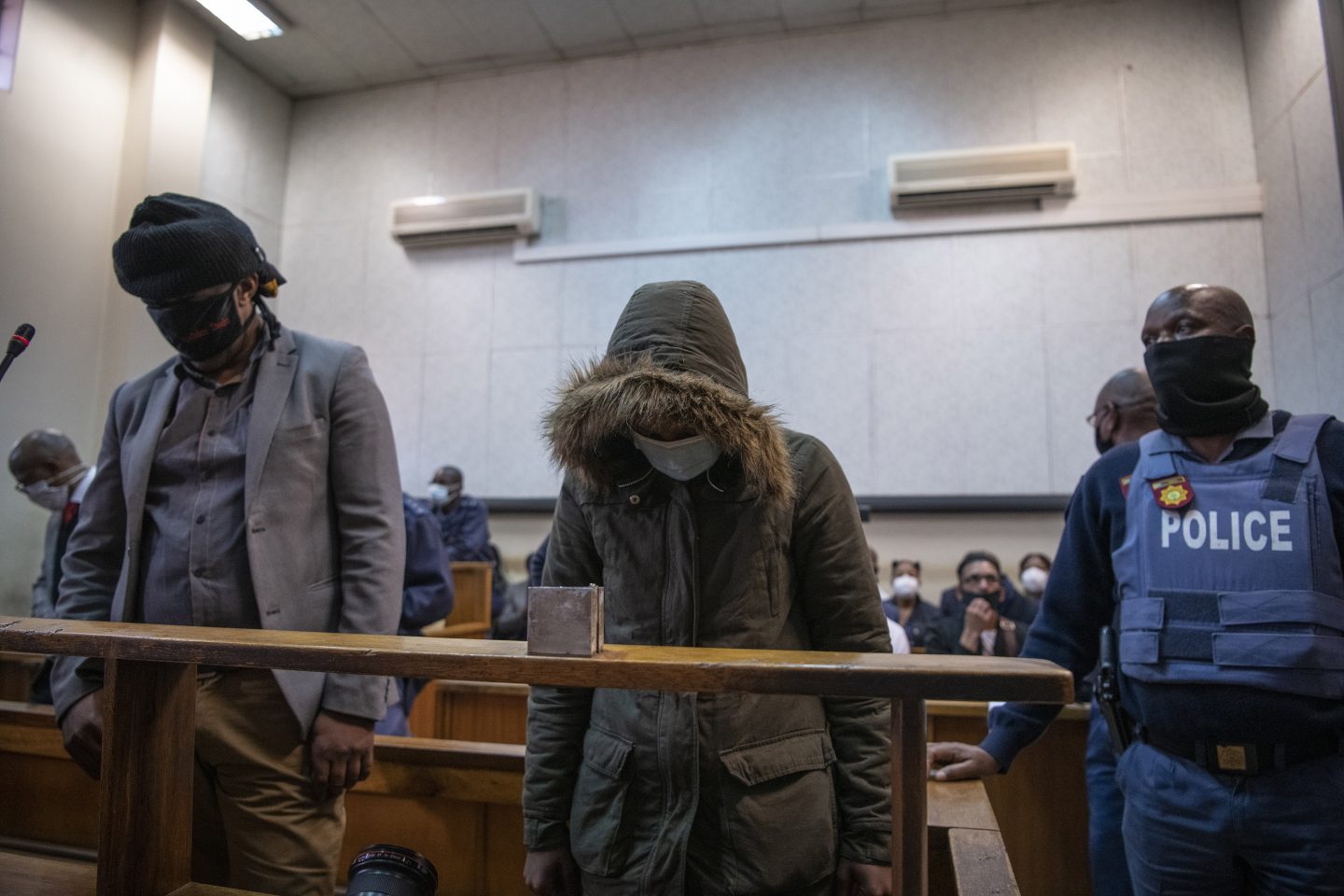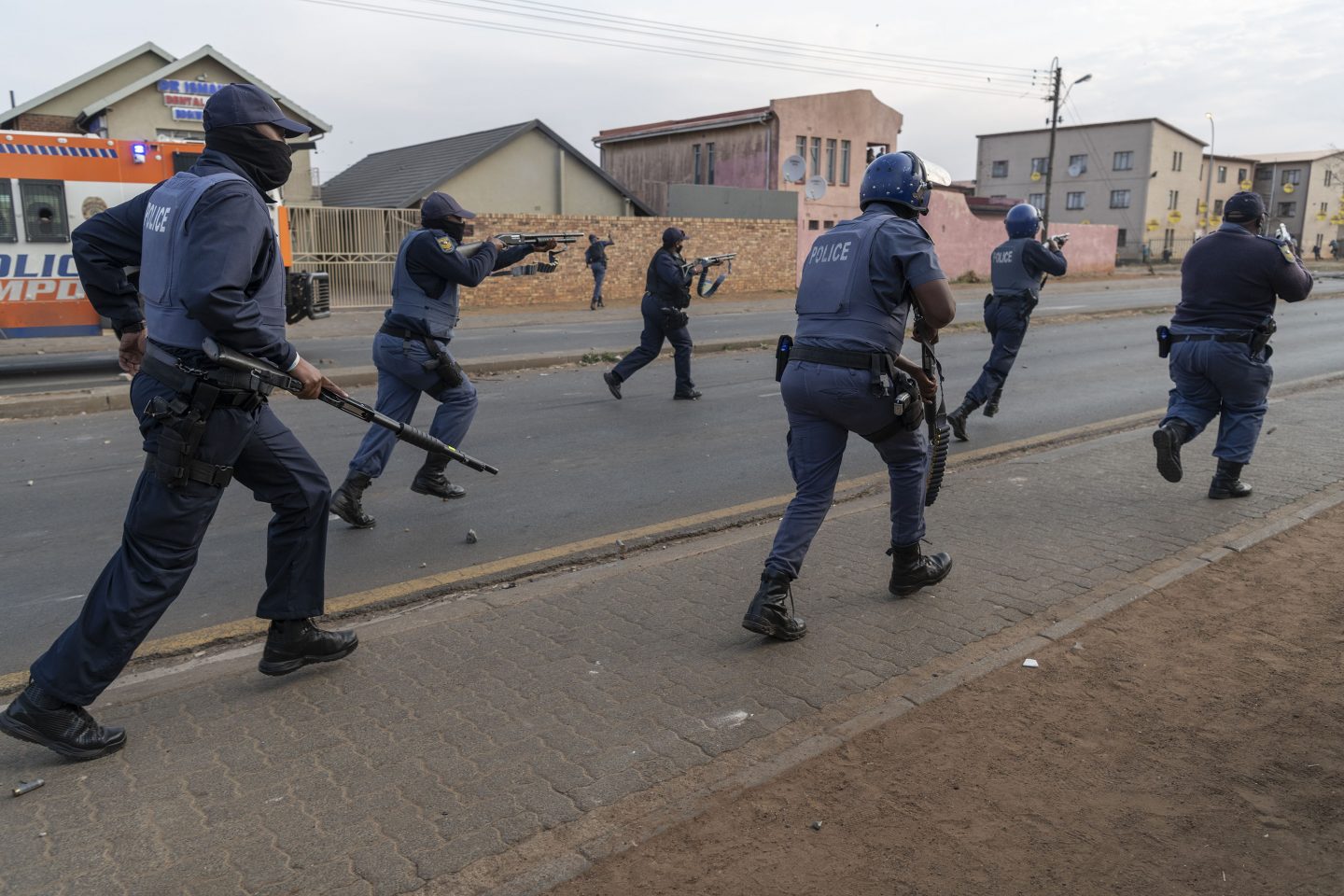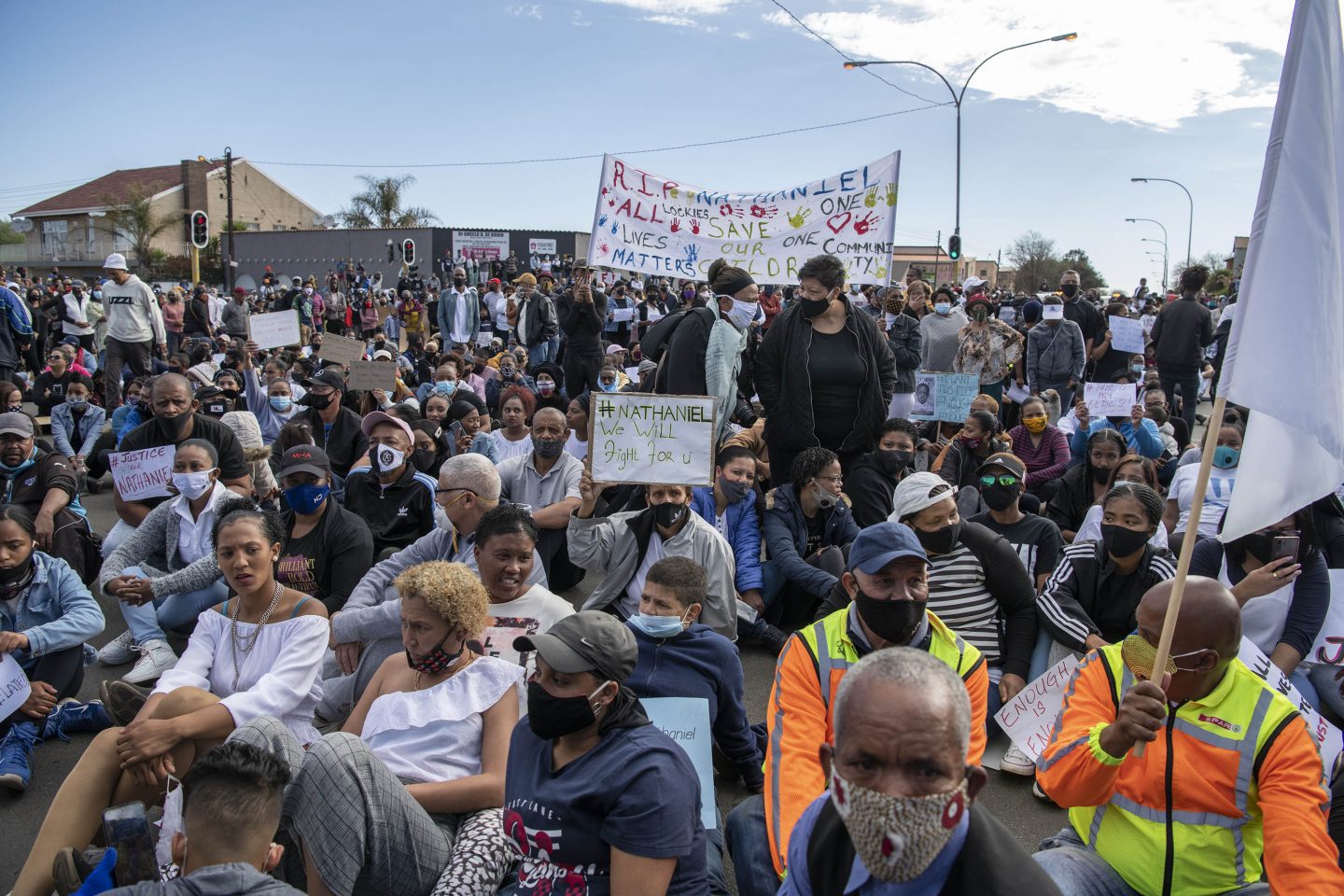Nateniel will dance no more
Those who knew Nateniel Julies say he was a jolly child, always ready with a greeting and a smile. At the drop of a beat, he would dance. A police bullet pierced through him and ended all that he w…
Author:
7 September 2020

On the perimeter of a block of flats in Eldorado Park sits a white truck with a pair of smudged handprints on its side. There is nothing particularly out of the ordinary about this, except that residents who walk past the truck keep pointing out the handprints, sighing heavily, seemingly in the grip of an unimaginable melancholy.
Some of them lay flowers at the base of the truck and say a little prayer, shedding silent tears.
Others march past it, angrily yelling, “Fuck the police!”
Residents say it was here, at this truck, that Nateniel Julies was killed. They say the handprints were made by Nateniel as he tried to steady himself against the truck after being jolted backwards by the force of the gunshot which smashed into his 16-year-old body.

The handprints slid downwards following the movement of his body as he collapsed to the ground. Two nights after Nateniel was killed, a charismatic preacher stood on the roof of the truck and addressed hundreds of mourners gathered below.
He invoked a biblical story, the murder of Abel by his brother Cain. “God told Cain that the voice of his brother’s spilt blood speaks to Him from the ground,” said the preacher as he pointed to the spot where Nateniel was shot. “Tonight, the blood of Nateniel is speaking to us. It is crying out for justice!,” proclaimed the preacher. “Amen,” came the sombre reply from the crowd below. Later that night, two police officers from the Eldorado Park police station would be arrested and charged with the murder of Nateniel.
A courageous child
Nateniel Bradley Julies was born in the middle of winter on 29 June 2004. This year, just a few months before his murder, he celebrated his 16th birthday. When he was a baby, Nateniel was diagnosed with Down’s syndrome, a genetic chromosome disorder that results in developmental and intellectual delays.
“When Nateniel was a baby and the doctors told me he has Down’s syndrome, I told myself that if this little body is going to go through so much in life then let me try to be courageous for him as a mother,” said his mother, Bridget Harris.
But it would be young Nateniel who would end up teaching his mother the meaning of courage. Hospitalised with bronchopneumonia and tuberculosis as a young child, Nateniel would demonstrate strength and courage in fighting off those illnesses to survive. Doctors told his mother that he would only possibly start walking after his seventh birthday, but by the age of two, Nateniel was up and about strolling around the family home and neighbourhood. “That’s how he grew up. He was so strong and brave and I took my strength from him,” said his mother. “Nothing could put him down, he was always with a smile on his face even though he couldn’t speak properly.”
Nateniel grew up in and around the neighbourhood surrounding the Hillbrow block of flats in Eldorado Park. His affable demeanour and his habit of greeting every single person he saw earned him many friends. Not many addressed him by his first name. Many in his community affectionately called him “Lockie”.
“His mother gave him that name. I think she first called him ‘Clockie’ because he was born on time. But then it somehow became Lockie and that’s what everyone always called him,” said his uncle, Malcom Julies, who said that his nephew had a unique ability to make people happy. “He was the only one who could make me laugh.”
Natalie Lombaard is Nateniel’s aunt. She recalls with fondness how he would lift her spirits when she was in a sour mood. “You know when you are having a really bad day, feeling horrible and you [are] just angry and tired, then I would see Lockie with that smile on his face and I would also just start smiling. Just like that. Like magic,” said Lombaard who spent many hours with Nateniel on his other favourite pastime, dancing.
The dancer and biscuit lover
“I think he would express himself through dancing. I would just grab his hand and we would dance to whatever music was playing. The minute he heard any music, he wanted to dance. First he moves slowly, but once he gets going he can dance for you the whole night,” said Lombaard.
Nateniel’s dancing became a regular feature at neighbourhood house parties, churches and anywhere music was played loudly.

“We will really miss him,” lamented Lombaard. “He was such a pure soul. I have children myself so I can’t imagine what his mother is going through. To lose a child is bad enough but to have him killed in that manner is just heartbreaking.”
If there was one thing that Nateniel loved just as much as dancing it was biscuits. His appetite for them was compulsive. Luckily for Nateniel, a spaza shop located right next to the family home provided him with a constant supply of his favoured snack.
Running the store for the past seven years is Mia Ripon, a soft-spoken Bangladeshi migrant who wears a warm smile. Over the years, Ripon established an affectionate relationship with Nateniel. It would have been hard for a bond not to develop. Nateniel was a frequent customer, visiting the store many times a day.
Like everyone in the community, Ripon is having a difficult time processing the boy’s untimely death. “He would come to the shop every day. Not just one time but many times. Always I know what he wants, it’s these biscuits,” said Ripon, pointing to a box filled with tiny plastic packets stuffed with brown biscuits.
“I have known him for many years. I could see that he is a special child, he can’t speak properly. Sometimes he has some small money and he buys the biscuits but other times I just give it to him for free, you know. Always no trouble, he was a good boy.”
Ripon’s store would sometimes be the first place where Nateniel would go in the morning and the last place he would stop by at night. There were days when he would be awake before the store was open and would be knocking on the gate, and that’s how Ripon knew it was time to open up for the day.
On that tragic Wednesday night, Nateniel once again found himself outside Ripon’s spaza shop. The shop owner estimates that it was around 9pm when Nateniel approached the counter with his usual request for biscuits. “I think someone gave him a R2 so I sold him one packet and then I gave him another one for free. I told him, ‘eat your biscuits and please go home’,” said Ripon.

The last night
Around the same time that Nateniel was outside the shop, his aunt Natalie Lombaard emerged from the family home next door. She had spent the evening with the family and was making her way home to her apartment at the Hillbrow flats but stopped at Ripon’s store to pick up a cigarette. “I saw Lockie there by the shop and told him he must go home as it’s getting late. I don’t know why he didn’t go straight home,” said a distraught Lombaard.
For some reason, Nateniel crossed the road and walked towards the truck parked outside the Hillbrow flats. Residents say that two police cars, with blue lights flashing, had entered the flats already and would emerge a little while later. What the police were doing there remains unclear. A few minutes later, a single loud bang penetrated the stillness of the night and reverberated around the neighbourhood.

“I heard this loud bang and came to my window to see what’s going on,” said Haroun Davids*, a resident who lives in an apartment overlooking the place Nateniel was shot. “I saw the police taking his body from under the truck, and they were struggling a bit as it was heavy. They dumped him in the back of the police van and drove away speeding,” said Davids.
Some community members also say that a police car returned a short while later and that police had walked over to the scene of the shooting and tampered with the evidence, covering up blood and picking up a bullet casing. Nateniel’s family had been alerted by witnesses to what happened, but when they rushed outside his body was already gone. When they approached the police at the nearby Eldorado Park police station for answers to the whereabouts of their child, they were stonewalled and not offered any assistance. Eventually, they ended up at the Baragwanath hospital in Soweto where they found the dead body of their son. In his pocket was his second packet of uneaten biscuits. The hospital staff told the family the police said it was gang related.

The police seem to have played the card of the “coloured gangster stereotype”, redefining the narrative of what really happened to Nateniel that Wednesday evening. The unproven claims that Nateniel was caught in the crossfire between gangs and the police was repeated by senior politicians and some in the media.
Gauteng Premier David Makhura put out a statement condemning the “violence” that led to the death of Nateniel, repeating the police’s version of the story. “Nateniel was allegedly killed during a shoot-out with members of the South African Police Services (SAPS) following a tip-off about stolen car parts. The boy who was disabled was allegedly caught in the crossfire between a gang and the SAPS,” said Makhura in an official statement.
That ‘gangster’ stereotype
Comedian Dillan Oliphant was born and raised in Eldorado Park. As a young man growing up in the community, he has had first-hand experience of what it’s like to be profiled by the police. “Are you even a coloured dude if you’ve never experienced police profiling?” jokes Oliphant at the start of a video he made in the immediate aftermath of Nateniel’s killing.
Oliphant tackles the narrative of the “coloured gangster” peddled by police. “They dropped his body at the hospital saying he was involved with gang activities knowing very well that he’s a coloured and that narrative will easily be eaten up by people who only see him as that. That’s who our police saw. They saw a suspect, a threat, a gangster, a life they could silence and invalidate. A coloured. Not someone’s child, a loved one, a human being,” said Oliphant.
From his second floor apartment, Cyril Kuyane watches a night vigil for Nateniel proceeding in the courtyard of the Hillbrow flats. Kuyane is the chairperson of the flats and has been living here for over 15 years.
He knows everyone here and everyone knows him. He pulls out his phone and displays the WhatsApp group chat whose members are Hillbrow flats residents. The group chat shows how the residents organised quickly to march to the police station early the next morning to demand the arrest of the police involved in Nateniel’s killing.
“It was us from the flats who went to protest at the police station the next morning after they killed Lockie. We all knew Lockie here and people loved him. I’m glad the people united and took a stand because if we didn’t make a big noise about this the police would of got away with murder,” said Kuyane.

“I’m also a member of the CPF [community policing forum] so I do patrols around here. I’ve lived here for many years and I know everyone around here. Let me tell you, there are no gangs here by Hillbrow flats. Whoever can tell you there are gangs here is lying,” adds Kuyane.
A crossfire or a gunfight between police and “gangs” would entail that multiple shots would have been fired. But all of the community members interviewed state clearly that they only heard one single gunshot. The single shot that killed Nateniel.
Police violence
The police responded to the community’s demand for justice by unleashing a torrent of violence on protesters, journalists and the general public. At times, police would enter the flats and fire tear gas and rubber bullets into peoples homes. Such reckless police behaviour recently led to the death of 9-year-old Leo Williams in Cape Town. Williams’ family say that the boy was sitting at home when he was hit in the head by a rubber bullet fired by a police officer during a protest.
Morgan Stanford lives on the ground floor of the Hillbrow flats. His windows are riddled with holes made from rubber bullets seemingly fired indiscriminately by police. Stanford was at home with his young children and wife when rubber bullets were fired into his home. His wife was hit and so was one of his young daughters. His brother-in-law was hit too. “It was very traumatising to see the blood coming out of my wife’s face, from my brother-in-law’s head. The children were screaming. The people [police] who should be protecting you are the ones that are shooting at you,” said an exasperated Stanford.
On Saturday 5 September there should have been a celebration at Nateniel’s family home for his mother’s birthday. There would have been a party, some cake and music, to which Nateniel would have danced all day. He would have probably ended his day off by popping over to Mia Ripon’s spaza for some biscuits. Instead his burial casket was carried down Nikkel Crescent, past the Hillbrow flats where he was so loved, past the truck where he was shot and into his family home. All Ripon could do is watch with tears in his eyes and a heaviness in his heart.
As thousands of people gathered outside the Eldorado Park police station on the weekend after Nateniel’s killing to demand justice, one protester summed up the fractured relationship between the community and police. “The most organised gangsters here in Eldorado Park are the South African police,” he said.

* Not his real name








